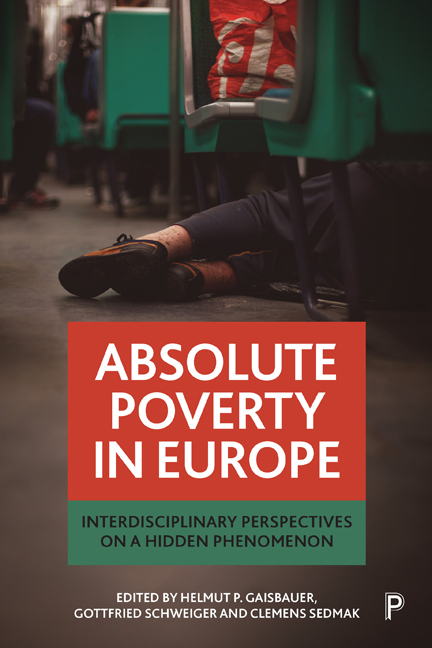Book contents
- Frontmatter
- Contents
- List of figures and tables
- Notes on contributors
- 1 Absolute poverty in Europe: introduction
- Part One Conceptual and methodological challenges
- Part Two Key issues for the absolute poor
- Part Three Policy responses to absolute poverty in Europe
- Part Four Ethical perspectives on absolute poverty in Europe
- Conclusion responding to the dark reality of absolute poverty in European welfare states
- Index
4 - The uncounted poor in EU-SILC: a statistical profile of the income and living conditions of homeless people, undocumented immigrants and travellers in Belgium
Published online by Cambridge University Press: 27 April 2022
- Frontmatter
- Contents
- List of figures and tables
- Notes on contributors
- 1 Absolute poverty in Europe: introduction
- Part One Conceptual and methodological challenges
- Part Two Key issues for the absolute poor
- Part Three Policy responses to absolute poverty in Europe
- Part Four Ethical perspectives on absolute poverty in Europe
- Conclusion responding to the dark reality of absolute poverty in European welfare states
- Index
Summary
Introduction
European antipoverty policies are monitored to a large extent by means of harmonised household panels in all member states, such as the EU Survey on Income and Living Conditions (EU-SILC). Whereas official poverty rates and related indicators based on EU-SILC are now widely used in national and EU-level policy documents, some of the (presumably) poorest groups (including homeless people and undocumented immigrants) are seriously underrepresented or excluded from such panels, or display disproportionate attrition rates. In the first place, this involves groups that fall outside the sampling frame of the EU-SILC, which (in Belgium) consists of private households drawn from the National Register:
• collective households (including elderly people in residential homes, people living in institutions or prisons) are therefore excluded despite the presumption that they experience more extreme forms of poverty;
• other categories are not listed in the National Register (or related registers) at all. This applies to undocumented immigrants, who are presumed to face more severe poverty but whose numbers are unknown.
In addition to groups that ‘by definition’ fall outside the sampling frame, some groups rarely or never stay at their legally registered address and consequently cannot be reached. This includes, for example, rough sleepers and homeless people, as well as travellers and itinerant groups.
Taken together, the aforementioned groups constitute between 2% and 3% of the Belgian population (210,000 to 320,000 people). Estimates vary greatly, particularly of undocumented immigrants. The impact of these groups on the ‘corrected’ rate of poverty in Belgium is difficult to estimate but could lie somewhere between 0.6 and 1.7 percentage points.
These groups are relevant because of their size and, more importantly, their specific living conditions (e.g. travellers) or their extreme poverty (for example, rough sleepers or undocumented immigrants). Considering the more severe living conditions that these groups are facing, their under- or nonrepresentation grows into a crucial problem because policy decisions may be taken based on data that potentially misrepresent or distort the actual situation.
The living conditions of these hidden groups of poor people in Belgium are highly relevant, as we suspect that they not only suffer from a lack of financial resources, but also from inadequate housing, limited access to essential services, mental and physical health problems, and other forms of exclusion.
- Type
- Chapter
- Information
- Absolute Poverty in EuropeInterdisciplinary Perspectives on a Hidden Phenomenon, pp. 73 - 96Publisher: Bristol University PressPrint publication year: 2019



